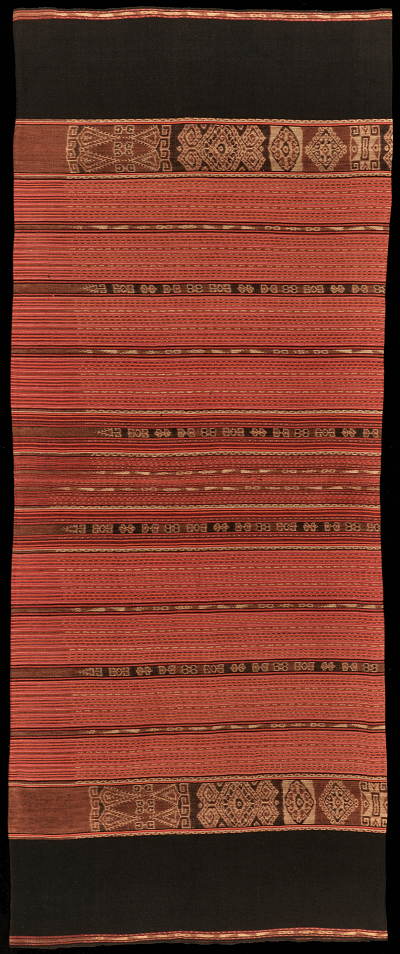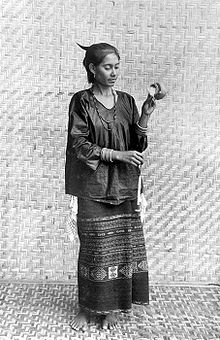| |
 
 | | | |
138 Moluccas, Kisar
Homnon (sarong)  
| | Locale: | Probably Meher (Kisar speaking) people. | | Period: | 1900-1930 | | Yarn: | Cotton, largely hand-spun | | Technique: | Warp ikat | | Panels: | 2 | | Size: | 66 x 166 cm (2' 1" x 5' 5") LW: 2.52 | | Weight: | 745 g (26.3 oz), 340 g/m2 (1.11 oz/ft2) | | Design: | Homnon for woman of the Meher (Kisarese) nobility, with large 'kota lama', the square blocks, and characteristic colouration, in which red and brownish tints predominate. Second, third and fourth motifs from the right all appear to be variants of the Timorese kaif pattern. Base-mounted tumpal motifs serve as finials of the widest ikat bars. Four narrower bands with different small motifs that end in small tumpal motifs. Unlike the Oirata cloths Meher ikats only rarely have anthropomorphic or zoomorphic motifs. Numerous narrow stripes with dotted lines. Two wide bands near the extremities in solid near-black, achieved by overdying morinda with indigo. | | Comment: | Important older sarong of excellent quality. Intricate and fine-grained motifs. Very well preserved. Very similar to PC 276, an aristocratic sarong in the colour palette of Luang of similar yet slightly less intricate design. Few comparable pieces in published collections. | | Background: | Chapters on Moluccas and Kisar. | | Exhibited: | Museu do Oriente, Lisbon, 2014/15.
Hong Kong University Museum and Art Gallery, 2017. | | Published: |
Woven Languages, 2014.
Ikat Textiles of the Indonesian Archipelago, 2018.
| | Compare: | 101 102 103 276 | | Sources: | Near-identical to homnon in Tropenmuseum, Nr. 77-34, also dated 1900-1925; and to one in Wereldmuseum, Nr. 24552, depicted in Magie van de Vrouw, but erroneously identified as 'Babar', and to one in Yoshimoto, Ikat, Fig. 199. Similar to Khan Majlis, Woven Messages, Fig. 312, except for the coloration of the two main bands, this one having the red with brown and black colour palette typical of Kisar, not Luang. Also similar to Khan Majlis, Indonesische Textilien, Wege zu Goettern und Ahnen, Fig. 500; De Jonge and Van Dijk, Vergeten Eilanden, Plate 8.3; and Voelger and Von Welck, Indonesian Textiles, the supplement by Khan Majlis, Fig. 195, 196. Similar sarong worn by Kisar woman spindle spinning on early 20th C. photo in collection Tropenmuseum, below.
 | | |

©Peter ten Hoopen, 2025
All rights reserved.
|
|


